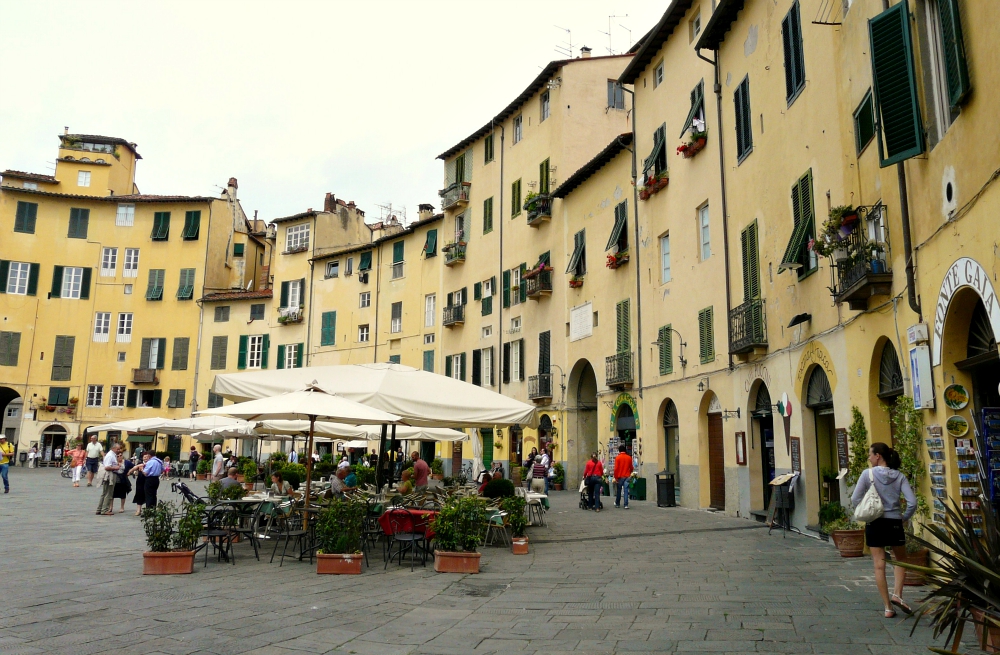
Piazza dell'Anfiteatro, Lucca, Italy (Wikimedia Commons/Davide Papalini)
My longtime friends Sharon and Mel are preparing to spend a month this fall in a rented villa in Lucca, Italy, the town in Tuscany from which my Italian ancestors come. And, candidly, I am just plain jealous.
We have not been there since 2011, which is far too long. Our life here at home in America is busy, and our time and resources — both financial and energetic — are consumed by work and family, leaving nothing leftover for travel.
Please don't read me wrong. My husband, Dan, and I remark almost daily how lucky we are to live where we live — with views of the Puget Sound and San Juan Islands from our windows. Capitalizing on this location and converting the two rooms in the small guesthouse in our backyard into vacation rentals has not only afforded us the chance to work from home, it allows us the flexibility to better care for our family and friends.
Not going to an office each day means we don't have to pay for adult day care for our autistic son, Nick (31), plus we get to provide day care for our granddaughter, Mary (4). And while Dan teasingly calls me the Fitted Sheet Whisperer — due to the volume of sheets and towels I wash and fold every day — I truly feel, as the saying goes, blessed with work. As an extra side bonus, I get to do most of it in my pajamas.
But during the daily routine of folding nice warm towels, making beds, scrubbing toilets, and wiping down tubs and floors, I find my mind sifting through a scrapbook of images of Lucca. Flashes of sunny afternoons at café tables, the smells of strong coffee and fresh bread, the animated chatter of passersby. Warm starry nights strolling the cobbled lanes among quieter crowds, the ancient stone churches and towers somehow grander in lamplight. I can almost feel the sunshine, smell the espresso, hear the muffled conversations.
Because what I miss the most about my ancestral hometown is the being out among people, every day and night, in the piazzas and streets, walking, smiling, greeting each other. Old people on their usual benches, running children, dogs sniffing the gutters, teenagers huddled amorously in corners, oblivious to the rest of us in their tanned beauty and arrogance.
Advertisement
In the extended village that is the walled city of Lucca, it always seems to me that there are no disposable people. Senior citizens are not stowed in old folks homes, and children are not contained in day care centers. Instead, the elders watch over the young while their parents work. Families gather in their apartments and villas for the afternoon meal or siesta, then go back out to work and into the streets until the businesses close. Dinner is late. The youngest and oldest go to bed while the rest rejoin their neighbors for strolling, gossip and one final espresso.
Every time I have returned home after visits to Lucca, I am newly aware of how comparatively isolated we are here in America. Most of us live in apartments or houses, often far away from siblings and parents, commuting to work and doing our errands in cars, eating our meals, watching our TVs, doing our chores, substantially alone.
Social media sites like Facebook and Instagram have in many ways replaced being social. Do any of us recall the time when we actually dropped in on our friends and neighbors, without calling first? We played a game of cards or Yahtzee, ate coffee cake, shared the news of the day and a couple drinks. Now, we monitor their activities on our cellphones or laptops, posting our comments about their most recent photos or simply signifying our approval with a stock emoji.
Our lives here are predominantly lived out in separate boxes, the smells and sounds and textures of village life only distantly remembered, if at all.
And while I appreciate the abundance and ease of life in America, I admit it: I pine for Lucca.
For the first couple weeks after I have returned from there, I am sure the Americans around me think I am a weirdo. I see the startled looks of other drivers as I wave hello to them as we speed by each other on the freeway. When I lift my hand off the steering wheel and nod acknowledgment to the car next to me at the stop sign, I see its driver look quickly away. When I bend to say hello to a child in stroller, his mother stares straight ahead and speeds up as they pass me in the grocery store aisle.
But I notice that as they turn the corner, the toddler cranes his neck to look back at me, catches my eye, and smiles.
He knows I am not crazy. He is as happy to see me as I am to see him. He has not been trained yet to stay in his own bubble.
I read that the average American requires at least 4 feet of personal space to feel comfortable. In Italy, the norm is half that. Here, manliness is implied by a firm handshake at the end of a straight arm, or a punch in the shoulder. There, men greet each other with a shout, a kiss on each cheek, then walk together with their arms draped over each other shoulders.
Here, we cluster in small groups of family and friends in our homes to watch the Super Bowl. There, soccer games are projected onto a huge movie screen in the village square, to which each able-bodied man, woman and child drags a folding chair. The less mobile are wheeled or carried by their neighbors to join in the cheers when their local team scores, or the communal grief when they miss.
I am deeply grateful to my great-grandfather Sestilio Faina, who emigrated from Lucca to America at the turn of the last century. Too poor to buy a ticket, he stowed away on a merchant vessel out of Genoa. An illegal immigrant, destitute and starving, he worked his way across the country, finally landing a job as a foreman in a Los Angeles macaroni factory. Only then could he afford to return to Lucca, marry my great-grandmother Assuema, and return legally through Ellis Island. Three generations later, I am now relatively well-off and well-fed.
The courage and hard work of Sestilio, like so many of our scrappy ancestors, allowed us to be Americans. But perhaps something besides their families and friends were left behind in the old country. That sense of community — the interaction between young and old, rich and poor, the being valued not so much for what you do as for who you are — is alive and well in places like Lucca.
I am certain that as Sharon and Mel sip their espresso and nibble on cannoli in the sunshine, they will soak all of that in. And until I can visit Lucca again, liking their photos on Facebook will have to do.
[Amy Morris-Young graduated from and taught writing at Loyola Marymount University in Los Angeles.]
Editor's note: We can send you an email alert every time a new Notes from Nonna column is posted to NCRonline.org. Sign up here.





